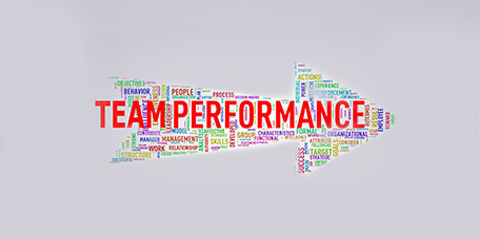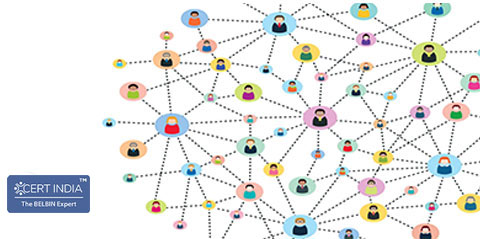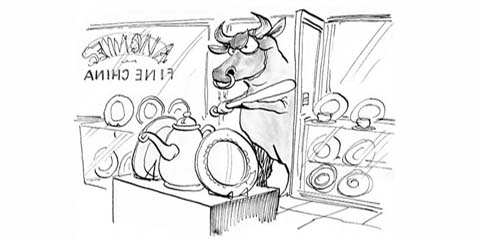Tuckman theory
In 1965, Dr Bruce Tuckman was doing ground-breaking work on group dynamics in Ohio. A couple of years later, Dr Meredith Belbin began his seminal research into team behaviours at Henley.
Tuckman studied teams from formation to completion of a task and identified characteristics of each stage of team development – forming, storming, norming and performing. Belbin’s observations of teams uncovered the nine Belbin Team Roles, which describe ways of contributing and interrelating in a team. Dr Belbin, as part of his research, shows us how Team Performance can be predicted before Teams are formed. Taken together the two models offer valuable insights into how 'Teamwork begins before a Team begins to work!'
If you are interested in getting proactive about Team Performance, you will benefit from knowing how do the Belbin and Tuckman Models fit together! Here's what is happening in Belbin terms as groups develop, and what can be done to give them the best chance of success at each stage as mapped by Tuckman.

Tuckman and Belbin - Forming stage
In Belbin terms, the team needs to get to know one another’s strengths and weaknesses, but they haven’t worked together long enough to provide Team Role feedback on each other. Completing a Team Role Circle as seen in Page 5 of a Belbin Team Report can provide a powerful visual illustration of the spread of roles within the team. A good Co-ordinator can bring the team together and identify how each person can contribute.
There is a risk that team members won’t want to address difficult topics for fear of causing conflict. Teamworkers in particular might be uncomfortable about arguments, but this part of the process is crucial to the team’s success. Completer Finishers and Specialists might be tempted to bring broader discussions down to a detailed or intensive level too soon. What if such conflict can be seen through before the team begins working? With Belbin one can!
Tuckman and Belbin - Storming stage
In Belbin terms, the team needs Plants to come up with new ideas, and Monitor Evaluators to analyse them dispassionately. Working Relationship Reports can highlight potential areas of conflict between individuals, giving discussion starters to work towards resolution. Teamworkers can help build relationships internally too. On the opposite side of the Team Role Circle as seen in Page 5 of a Belbin Team Report , Shapers can be valuable at this stage, as they’re forthright, will prevent the Co-ordinator from getting too involved in team politics, and will help move discussion on from ideas to outcomes.
There is a risk that too many Plants could be competing for ideas, or could feel demotivated by the Monitor Evaluator who points out the glitch in their idea. Shapers are useful, but should be deployed with caution at this stage: if their competitive streak turns aggressive or confrontational, this needs to be addressed, to ensure good relationships going forward. What if such unpleasantness can be seen through before the Team was commissioned? Well, with Belbin you can!


Tuckman and Belbin - Norming stage
In Belbin terms, the team needs a clear understanding of who should do what. Knowing Team Role strengths and weaknesses within the team will enable the team to identify who might be suited to which kinds of work more easily. Co-ordinators are proficient at facilitating group decisions. Implementers are well-placed to make plans for efficient processes, provided they have a reliable – and unchanging – structure to work with. Resource Investigators are needed to go outside the team and gain insights into the competition.
There is a risk that Plants might cause disruption by trying to interest the team in a new idea when work is already underway. At this stage, they might prefer to move on to another team where they can be involved in the earlier stages once more. Again, what if such disruption can be predicted before the Team is selected? With Belbin, you can!
Tuckman and Belbin - Performing stage
In Belbin terms, the team needs to continue to use the language and understanding that Belbin gives to ensure that they continue along the route of becoming a High Performing Team. Constant communication is key. Referring back to Belbin Individual Reports as the project changes to ensure that the right people are being involved at the right time. Here again, how would it be if such involvements can be planned before a Team kicks-off? With Belbin, you can!


Tuckman and Belbin - Adjourning stage
Longstanding teams may expand, recruiting more members and building on their successes, or may disband after the successful completion of their project. But that’s best case scenario. Plenty of teams get stuck and end up repeating the first two stages over and again, especially if they do not frequently meet in person.
The language of Belbin Team Roles can speed up the process of moving teams from one stage to the next, by giving team members insight into one another and the contributions needed to help the team work.
This common frame of reference enables individuals to engage, express preference, explain how they work best and resolve conflict with each other. This is invaluable if a team has never worked together before, or if there is a ‘new’ and ‘old’ guard scenario – Belbin is always a great leveller and aids with cohesion.
Next steps
Start learning and using the language of Belbin Team Roles to help your teams along the Tuckman stages! Leapfrog to performing. With Belbin, you can! Because ahead of Forming, you can 'Preform' Teams. You read that right.. You can create as many blueprints of possible Team Options, preview the interpersonal chemistry that the Team is likely to experience in each option, before you formalise the optimal Team Selection, that's consistent to the Team's Purpose. In a Belbin world, Teamwork begins before a Team begins to work!
Become Belbin Accredited or contact us and have a chat - we would love to help you !





















